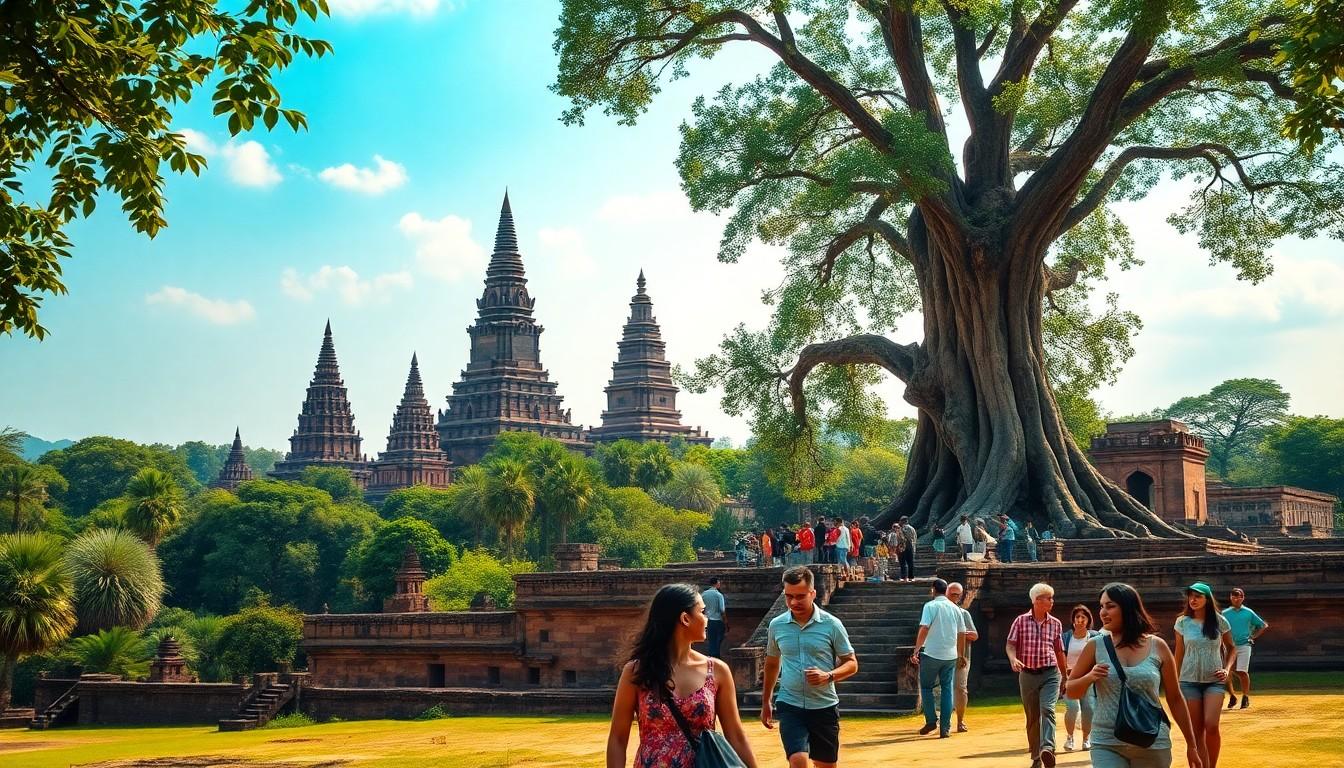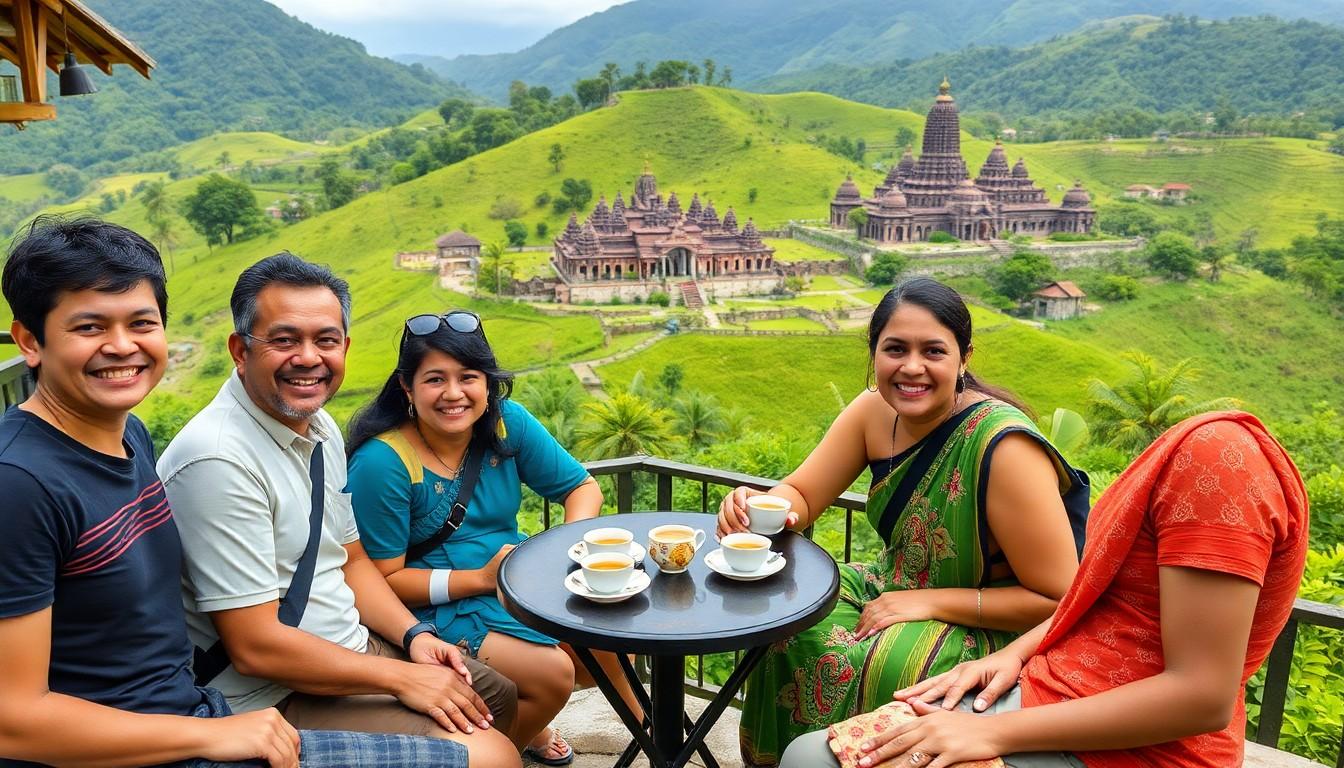Imagine sipping a hot cup of Ceylon tea while surrounded by lush green hills and ancient temples. Cultural tours in Sri Lanka offer a delightful blend of history, tradition, and a little bit of adventure. This island paradise isn’t just about stunning beaches and wildlife; it’s a treasure trove of vibrant cultures waiting to be explored.
Cultural Tours in Sri Lanka
Cultural tours in Sri Lanka provide a deep insight into the island’s heritage and traditions. Travelers can explore ancient cities, such as Anuradhapura and Polonnaruwa, where remarkable ruins and monuments stand testament to the island’s storied past. Sites like the Temple of the Tooth in Kandy offer a glimpse into Buddhist practices, showcasing rituals that have persisted for centuries.
Visitors experience local festivals, like the Kandyan New Year and Esala Perahera, which feature vibrant parades, traditional music, and elaborate dancer performances. One attraction captures the essence of Sri Lankan culture; the spice gardens of Matale reveal the flavors and aromas that define the island’s cuisine.
Guided tours often include visits to artisan workshops, where local craftspeople demonstrate techniques in pottery, weaving, and mask-making. Grasping local customs becomes an engaging aspect of these tours; cooking classes highlight the diverse culinary practices that residents cherish.
Engaging with local communities enriches the experience, providing opportunities to learn about daily life and traditional practices. Cultural tours also often encompass the stunning landscapes that serve as a backdrop to these rich traditions, such as the ancient rock fortress of Sigiriya or the serene backwaters of Nuwara Eliya.
Overall, cultural tours showcase the unique blend of history, spirituality, and artistry that Sri Lanka holds. Travelers leave with a profound appreciation for the island, capturing memories of its remarkable culture long after their journey ends.
Key Destinations

Cultural tours in Sri Lanka highlight several key destinations that showcase the island’s rich heritage.
Anuradhapura
Anuradhapura, a UNESCO World Heritage site, stands as one of the most significant ancient cities in Sri Lanka. Significant ruins reveal the grandeur of a civilization that thrived over 2,000 years ago. Travelers can explore the sacred Bodhi Tree, believed to be a sapling from the original tree under which Buddha attained enlightenment. Massive stupas, like the Ruwanwelisaya, showcase stunning architectural brilliance. Visiting these sites provides deep insights into the island’s Buddhist heritage.
Polonnaruwa
Polonnaruwa offers another glimpse into Sri Lanka’s historical significance. This ancient city, a UNESCO site, contains well-preserved structures reflecting the splendor of the 11th and 12th centuries. The Gal Vihara complex features rock-cut Buddha sculptures that mesmerize visitors. Kings’ royal palace ruins illustrate the architectural ingenuity of that time. Exploring the ancient reservoirs reveals advanced engineering skills used for irrigation, essential to the region’s agriculture.
Kandy
Kandy, known for its vibrant cultural scene, houses the revered Temple of the Tooth Relic. This sacred site attracts pilgrims and tourists alike, offering a chance to witness traditional rituals. The city’s picturesque lake adds to its charm, providing a serene environment for leisurely strolls. Kandy’s annual Esala Perahera festival captivates audiences with grand parades showcasing dancers, drummers, and elaborately adorned elephants. Visiting local markets allows travelers to experience the rich tapestry of Sri Lankan crafts and spices, enriching their cultural journey.
Unique Cultural Experiences
Cultural tours in Sri Lanka immerse travelers in the island’s rich traditions. Unique experiences await in every corner, offering deep appreciation for the local heritage.
Traditional Festivals
Festivals like Esala Perahera in Kandy showcase vibrant parades and intricate costumes. Participants celebrate the sacred Tooth Relic, creating a captivating cultural spectacle. Visitors can also experience local celebrations during the Kandyan New Year, featuring lively dances and traditional music. Each festival creates a sense of community, inviting travelers to join in the joy and festivities. Understanding these cultural events provides insight into Sri Lankan values and traditions.
Culinary Tours
Sri Lankan cuisine offers a flavorful journey for visitors. Culinary tours highlight the use of aromatic spices, fresh ingredients, and unique cooking techniques. Tourists can participate in cooking classes, learning to prepare dishes like rice and curry or hoppers. Local markets provide a sensory experience, with colorful produce and artisanal goods on display. Sampling street food enhances the culinary adventure, providing a true taste of the island’s diverse flavors.
Art and Craft Workshops
Artisans in Sri Lanka have mastered various crafts that visitors can explore firsthand. Workshops often include pottery, weaving, and traditional mask-making. Participants engage with skilled craftspeople, gaining insights into the techniques used for generations. Learning about these art forms allows travelers to appreciate the creativity and cultural significance behind each piece. Creating a personal souvenir fosters a deeper connection to the island’s craftsmanship.
Tips for Travelers
Planning a cultural tour in Sri Lanka enhances the overall experience. Travelers gain valuable knowledge by considering some essential tips.
Best Time to Visit
The ideal time to explore Sri Lanka’s cultural sites varies by region. December to March offers pleasant weather for visiting the cultural triangle, including Anuradhapura and Polonnaruwa. For those keen on enjoying Kandy’s vibrant festivals, July and August provide a fantastic opportunity to witness the Esala Perahera. Rainfall impacts travel plans during the monsoon season, which lasts from May to September in some areas. Coastal regions tend to have consistent weather from January to April, ensuring tourists experience pleasant beach days alongside cultural tours. Emphasizing the significance of seasonality in planning ensures travelers maximize their experiences.
Cultural Etiquette
Respecting local customs enhances interactions during cultural tours. Visitors should dress modestly, especially when visiting temples. Covering shoulders and knees is essential when entering sacred sites. Greeting locals with a friendly smile also promotes positive engagement. It’s polite to remove shoes before entering temples or homes. When taking photos, always ask for permission first, particularly in sensitive areas. Understanding that Sri Lankan culture values hospitality, travelers should reciprocate kindness to foster connections. Observing these etiquette guidelines enriches the overall journey, making the experience more memorable and respectful.
Vibrant Tradition on Travel
Cultural tours in Sri Lanka offer an unforgettable journey through the island’s rich heritage and vibrant traditions. Travelers can immerse themselves in ancient history while savoring the unique flavors of local cuisine. Engaging with artisans and participating in lively festivals fosters a deeper connection to the local culture.
With stunning landscapes as a backdrop visitors gain a profound appreciation for Sri Lanka’s artistry and spirituality. This enchanting destination invites exploration and promises experiences that resonate long after the journey ends. Embracing the island’s cultural tapestry ensures that every traveler leaves with cherished memories and a newfound understanding of Sri Lanka’s remarkable heritage.

 Cultural tours in Sri Lanka highlight several key destinations that showcase the island’s rich heritage.
Cultural tours in Sri Lanka highlight several key destinations that showcase the island’s rich heritage.